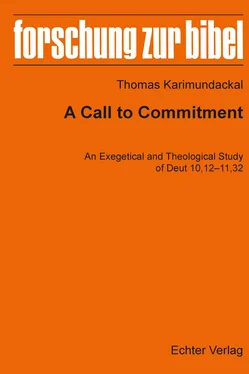1.1.1 Deut 10,12-13 in the Parenesis (Deut 6-11)
1.1.2 What does the Lord your God demand from you? (v12ab)
1.1.3 Principles of a Yhwh-centred existence
1.2 Deut 10,14-15: Yhwh’s sovereignty and his elective grace
1.2.1 Sovereignty of the Lord over the universe
1.2.2 Yhwh’s elective grace upon Israel
1.3 Deut 10,16: Circumcise your heart
1.3.1 Circumcise the foreskin of your heart
1.3.2 Stiffen your neck no more
1.4 Deut 10,17-18: Yhwh’s uniqueness and sovereignty
1.5 Deut 10,19-20: Love the sojourner and commit yourself to the Lord
1.6 Deut 10,21-22: Yhwh’s uniqueness and his mighty deeds
2. Deut 11,1-7: Israel’s challenge for a Yhwh-centered existence
2.1 Deut 11,1: Love the Lord and keep his charges
2.2 Deut 11,2-7: To know the mighty deeds of the Lord
2.2.1 Structure and syntax of 11,2-7
2.2.2 You shall know today for it is not your children … (v2ac)
2.2.3 Deut 11,2d-3a: Yhwh’s greatness and primacy
2.2.4 Deut 11,3b-7: Yhwh’s redemptive grace and judgment
3. Deut 11,8-17: Israel’s prospect of a Yhwh-centred existence
3.1 Deut 11,8-12: Obedience and the gift of the land
3.1.1 Deut 11,8-9: Obedience and long life in the land
3.1.2 Deut 11,10-12: Description of the land
3.2 Deut 11,13-15: Obedience and prosperity in the land
3.3 Deut 11,16-17: Warning against apostasy
4. Deut 11,18-25: Israel’s accountability for a Yhwh-centred existence
4.1 Deut 11,18-21: Regular instructions of the law
4.2 Deut 11,22-25: Keep the commandments and possess the land
5. Deut 11,26-32: Israel’s choice of a Yhwh-centred existence
5.1 Deut 11,26-28: Choice of blessing and curse
5.2 Deut 11,29-32: Yhwh’s giving of the land and Israel’s response.
5.2.1 Deut 11,29-31: Ceremonial blessing and curse
5.2.2 Deut 11,32: Final appeal to observe the commandments
CHAPTER 4
THEOLOGICAL SYNTHESIS AND ACTUALIZATION OF DEUT 10,12-11,32
1. Deut 10,12-11,32 as a summation of Deut 1,1-10,11 and a link to Deut 12,1-34,12
1.1 Common elements
1.2 The expressions unique to Deut 10,12-11,32 and their significance
1.3 Conclusion
2. Deut 10,12-11,32: a key to the theology of Deuteronomy
2.1 The incomparable Yhwh – the portrait of Yhwh ,
2.1.1 Deut 10,12-22: a sovereign - just - unique Yhwh
2.1.2 Deut 11,1-7: a great redeemer Yhwh
2.1.3 Deut 11,8-17: a caring, ‘angry’ Yhwh
2.1.4 Deut 11,18-25: a mighty - fearsome Yhwh
2.1.5 Deut 11,26-32: a faithful Yhwh
2.1.6 Conclusion
2.2 Israel – a chosen people
2.2.1 Israel – Yhwh’s chosen people
2.2.2 Israel – a people called upon to make a commitment to Yhwh
2.2.3 Conclusion
2.3 The land as the gift of Yhwh: the land in Deut 10,12-11,32
2.3.1 The land belongs to Yhwh
2.3.2 The land as a gift of Yhwh
2.3.3 The land as a fulfilment of the promise to the fathers
2.3.4 The land as a gift in return for allegiance to Yhwh
2.3.5 The land as a good and prosperous land
2.3.6 The land as an object of Yhwh’s special care
2.3.7 Conclusion
2.4 The law and obedience as requirement of a Yhwh-centred existence
2.5 Justice as the expression of a ‘just’ Yhwh
2.6 Blessing or curse – a choice to be made
2.8 Worship of Yhwh - a manifestation of true allegiance to Yhwh
2.9 Conclusion
3. Actualization: theological implications of Deut 10,12-11,32
3.1 Cherishing the Divine-human relationship
3.2 Sharing the resources of the earth
3.3 Be compassionate to the needy and the disadvantaged
ABBREVIATIONS
BIBLIOGRAPHY
INTRODUCTION
1. Choice of the subject
The book of Deuteronomy is arguably the pivotal book for the entire Old Testament, both for its content and its theology. The theological skill and genius of the authors can be recognized in the manner of its composition. The theological assertions of the book are mostly concentrated in chs. 4.30. 32, and in the parenetical section of Deuteronomy (6-11), and their theological focus gives profound insights into and directions for Israel’s need for a Yhwh-centred existence. While the pareneses 1in Deut 6-11 reflects a tone of individual persuasion, it also recognizes the importance of the community. Every individual and each segment of the community is exhorted to obey the terms and conditions of the covenant for the survival of the community itself.
The large block of the pareneses in Deut 6-11 can be divided into five subsequent parenesis (6,1-25; 7,1-26; 8,1-20; 9,1-10,11; 10,12-11,32), showing various aspects of the nature of a lasting covenant relationship between Yhwh and Israel, namely its foundation, essence and perpetuation. While 6,1-25 lies at the very heart of the relationship between Yhwh and Israel, in 7,1-26 Moses warns Israel against apostasy and exhorts them to be distinctive because it is with them that Yhwh made a covenant. In 8,1-20 Israel is asked always to remember Yhwh’s mercy to them, and in 9,1-10,11 Moses reminds them that they are a stubborn people, yet chosen and spared by Yhwh’s grace.
For this study, I limit myself to the final section of the pareneses in Deuteronomy (10,12-11,32), while keeping in mind the development of the entire pareneses in chs. 6-11. Deut 10,12-11,32 emphasizes the twofold dimension of the perpetuation of Israel’s covenantal relationship with Yhwh, namely Israel’s allegiance to Yhwh and more fundamentally Yhwh’s gracious, sustaining hand towards Israel. Israel must seek and make a total commitment to Yhwh - the great, just, mighty and awesome God, who is faithful in keeping his promises - lest they not live long in the Promised Land. The inheritance of the land, which is a gracious gift from Jhwh, and their life in it call for a loving service of Yhwh. In short, the land which Israel is going to enter calls for a Yhwh-centred existence, and it solely depends on Israel’s choice of Yhwh and their decision to follow his commandments.
2. Why this pericope?
Scholarship on Deuteronomy 2in the past unravelled various dimensions of the pareneses in Deuteronomy and interpreted their relevance for the reader of their times. The fruit of the research can be easily found in various dissertations 3and biblical commentaries, 4reflecting various approaches to the pareneses in Deuteronomy. While these research materials are in general helpful and constructive, the exposition of 10,12-11,32 in these materials hardly achieved a comprehensive understanding of the text. Moreover, a synchronic examination of Deut 10,12-11,32 is very often limited to the framework of their projects as a whole. In addition to this, there is no monograph or hardly any research article on Deut 10,12-11,32 discussing its various aspects. 5The present study intends to meet this need.
Above all, scholars are often puzzled by the complexity of this unit - its rhetoric, form, style and language. Various theological themes, such as the nature of God, the covenantal requirements of the Lord, Divine-human commitment, Promised Land, obedience to the Law/commandments, justice and concern for the less privileged in society, instruction to children, blessing and curse, etc. are interwoven in this episode and call for an appropriate theological interpretation of the composition of Deuteronomy. Deut 10,12-11,32 could be considered as a summary of the preceding sections, and a link to the succeeding sections of Deuteronomy. Therefore, this unit could be taken as a hermeneutical key to understand and to interpret the theology of Deuteronomy.
3. Goal of the study
On the one hand, this study is intended to examine critically various scholarly contributions to the text, and on the other hand it looks into the synchronic aspects of the text on both macro and micro levels. Thus, the objectives of the study can be summed up as follows:
Читать дальше












